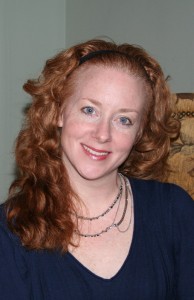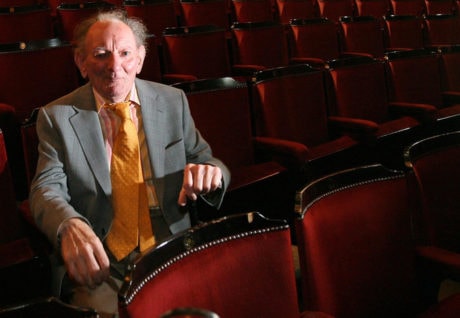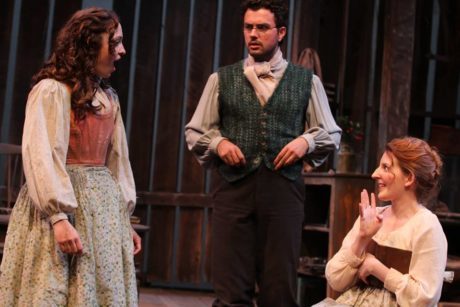Villanova University, with its long theater tradition, has fostered not only the classics, but Irish theater for many years. To honor the 100-year anniversary of the 1916 Easter Rising in Dublin, Villanova is now digging deep into the historical struggles, making visible the clashes between Britain and Ireland, by presenting Brian Friel’s Translations. This two-part interview with Director Valerie Joyce analyzes important aspects of this play in part 1, followed by a detailed description of the production in Part 2.
The Irish Chekhov, coming to Philadelphia
Henrik: Brian Friel who has been called “the Irish Chekhov,” unfortunately passed away last October. What made you choose his Translations for your latest production at Villanova University?

Valerie: Friel’s work has long fascinated me, ever since I worked as a costume designer on two productions, Dancing at Lughnasa directed by James Christy here at Villanova and Translations at the Professional Theatre Training Program at the University of Delaware, directed by Jack Going almost two decades ago. When the department decided to dedicate a production this spring to honor the 100-year anniversary of the 1916 Easter Rising, this play seemed like a beautiful tribute to the spirit of the Irish quest for independence and a worthy challenge for our graduate student actors.
What stood out for you in that production?
I fell in love with Friel’s brilliant use of language and his characters’ humor and pathos. I think this was my youth at the time, but I particularly attached to Maire (Amanda Coffin) and Manus’ (Stephen Tornetta) relationship and the painful realities surrounding their situation.
How did you visualize this new Villanova production?
I wanted to focus on the difficult choices these characters must make and the way Friel allows the audience to see their decisions as a result of the world that is crumbling around them. The role of Maire is a challenge for an actress for many reasons, not the least of which is that, as written, she can easily come across as opportunistic. Friel writes a hairpin turn for her in Act 2 as her affections shift and, if that shift is not motivated by her strength of character and her determination to survive, she can read as cold-hearted. Owen (Chris Monaco) is another character who, if not fueled by the charm and zeal that Friel describes in the text, can be difficult for an audience to attach to as the center of the conflict in the play.
Playwright Friel was quoted as saying that Translations is “a play about language and only about language.” This play seems to cover a wide range of language-related issues.

One of the first conversations we had as a cast, since this is also a graduate program, centered around hallmarks of colonialism and the erasure of culture through the erasure of language. The beauty of Friel’s quote is that he is right – the play is only about language—but he explores how language is utilized on every level of human life in the play, which is why it also seems to be about love, loss, fathers and sons, history, culture, conquest, religion, sex, and agriculture. He illuminates for his audience the ways language connects us to one another, the ways we communicate without language, and the profound absence we experience when language is lost.
Friel actually uses four different languages—English, Greek, Irish, and Latin—to show the difficulty of communicating with each other. How did you and the actors handle the linguistic parts, especially the challenging situation of only the audience understanding what each person is saying, but not all the characters comprehending what is being said?
Luckily, Friel thought this out for us and offers such clarity in the dialogue and stage directions that simply following his instructions is often enough to accomplish the goal. The real joy of working on the piece is finding the moments where he leads the audience down the path by having the characters seem to understand one another, only to then offer a line that lets the audience know that they really have no idea what the other is saying. He sets these moments up carefully over the course of the play so that they really pay off in the moments he needs them to. As for the actors, they did have a lot of work to do, not only learning Greek and Latin, but then learning Irish and English dialects, and then how to say the Greek and Latin in their dialect!
That’s a tall order, even for the Villanova Theatre department with its great connections to Irish theatre and culture and the classical world of Greece and Rome. Tell us more about the dialect coaching for this production.
A tall order indeed, since each of these students came to the dialect from a different experience level and training. Naturally finding a common ground, as if everyone came from one place, was a large part of their workload. The chair of the Classical Studies department made the students a really helpful audio pronunciation guide of the Greek and Latin, and they then worked with Sarah Doherty, a Philadelphia actress and dialect coach who hails from Dublin. We made the purposeful choice of a “general” Irish sound rather than the Northern Irish sound that would be closer to “realistic,” as that sound is harder to understand to the American ear, particularly on stage. Most of these actors did this work while performing in another show this spring, completing three graduate classes, and working full time!
Friel’s powerful and challenging play needs attentive listeners.
This play places a great value on the act of listening. As teachers and directors, we tell actors that active listening is crucial on stage. As I watch our audiences, a remarkable thing happens – they actually lean forward to listen closely.
Translations brings alive 19th century Britain—with Ireland still being under total British control. How does such a play speak to a contemporary American audience?
In our current political culture, we have moved to a point where the candidates seem to be no longer listening to one another and their constituents have tuned out the white noise of rhetoric and bile. This play may speak to our need as a community to listen to one another, to pay attention when aspects of our lives and our culture are slowly being eroded away, and to become engaged by the struggle to fight for what is important to us.
Could you give an example from the play?
In a telling exchange in Act 1, Friel examines the role of the translator, as Owen interprets Captain Lancey’s (Dan Cullen) announcement describing the British mapping mission. Owen’s translation for his Irish-speaking friends deftly adjusts the meaning of Lancey’s statements, so that the British presence will not seem as threatening or invasive. For example, when Lancey states that, with this new map, “the entire basis of land valuation can be reassessed for purposes of more equitable taxation,” Owen tells his listeners, “This new map will replace the estate-agent’s map so that from now on you will know exactly what is yours in law.” Then, when Lancey references previous evictions as “forfeiture and violent transfer of property,” Owen translates, “The captain hopes the public will cooperate with the sappers and that the new map will mean that taxes are reduced.”
During this exchange, I hear audience members verbally respond to the drastically different interpretations as they realize how the person communicating the message is also in control of the information and that the translator’s perception of what their audience wants to hear results in a palatable, if inaccurate, communication of the message. This brings to mind the power of the press, the political spin doctors, and social media.

U.S. history begins with the conquest of Native Americans by invading Europeans and now shows the dominance of American culture worldwide—all sensitive subjects. Translations is set against the background of British conquest and imperialism and the struggle of the Irish to keep their integrity and their heritage.
Friel is very careful to populate his play with characters who are on the intellectual ends of this struggle. He introduces the dirty peasant farmers who are learning to write in their mid-twenties and the shabby but proud educated men of an earlier generation. These characters effectively concentrate the play on the outcomes of the colonizing struggle. And, while there is mention of the sappers—the British soldiers who are physically engaged with the mapping project and who may be a threat to the town—the audience only meets the military cartographer and orthographer (Sean Connolly), the intellectual men who make the map and rename the places.
Tell us about the significance of two people living two different cultural perceptions: Yolland, an idealistic British orthographer and outsider in Ireland, who wants to preserve Irish names and culture, and Owen—an Irish translator for the British, but also for his fellow Irish-speakers—a man who is quite willing to anglicize Irish names, apparently blind to the damage done to Irish culture.
Part of what is interesting about the play’s production history is that it is often touted as a love story, since it features one of the most enchanting love scenes in the English language. However, the real core of the plot is Owen’s rediscovery of the value of and willingness to fight for his own cultural heritage. As the son who left his Father’s hedge school to become a successful shop owner in Dublin, he proclaims that he “got out in time.” However, each person he encounters in his old home –his brother, his father (Kevin Esmond), his English soldier friend—forces him to recognize that the antiquities he regards with disdain are of great value and are being erased by his very actions.
Running Time: Two hours and 30 minutes, including an intermission.
Translations plays through this Sunday, April 24, 2016, at the Vasey Hall Theatre of Villanova University – 800 East Lancaster Avenue, in Villanova, PA. For tickets call (610) 519-7474, or purchase them online.
LINK:
An interview with Villanova Theatre’s ‘Translations’ Director Valerie Joyce: Part 2: Behind the Scenes of Her Production of ‘Translations’ by Henrik Eger.
Neal Newman’s review of ‘Translations’ on DCMetroTheaterArts.




